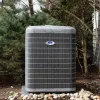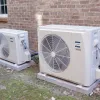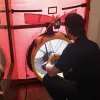Gas leaks are serious business. If you smell gas in your home right now, please stop reading this article, leave your home, and call the gas company. We’re about to discuss how to stop a gas leak before the leak occurs. However, if you suspect you’ve got a gas leak today, it’s probably too late to stop it. You should leave your home immediately.
With that caveat out of the way, let’s talk prevention! Technically, a gas leak risk exists in any home where there are gas appliances. Furnaces, ranges, water heaters, clothes dryers… if you use natural gas for any of these, it’s a good idea to develop a gas leak prevention protocol.
Our team encounters gas leaks in Atlanta homes more often than you might think. In almost every case, the leak could have been avoided with some simple upkeep. Here’s the best course of action for preventing a gas leak in your home.
1. Maintain your HVAC system
Safety is a major component of preventative HVAC maintenance. When your HVAC contractor visits your home to perform a furnace inspection (you are having your system inspected before every heating season, right?), he or she should be testing for gas and carbon monoxide (CO) leaks as part of the procedure.
CO leaks are dangerous because CO is extremely harmful to breathe. Gas leaks are dangerous in part because they can cause an explosion, but they can also lead to CO leaks in certain situations. When an appliance isn’t getting enough gas (due to a leak), it could throw off the combustion process and start producing more CO than it’s able to exhaust safely. That’s dangerous.
While CO leaks are more common around old (cracked) heat exchangers and the exhaust components of other gas appliances, gas leaks occur most often on the incoming gas line that connects to your furnace. Why do leaks happen? A variety of reasons, including:
- Corroded fittings between different sections of gas line
- Poorly installed or loose gas line fittings
- Improper furnace installation
- Hairline fractures on old sections of gas line
When we inspect your HVAC system, we use a gas leak detector to determine whether there’s a leak in the system. Oftentimes, the leak will be in a ventilated area, like your attic, so you won’t be able to smell the gas indoors. Even if you can’t smell the gas, the leak still poses a danger. After all, there’s a flame in your furnace – a flame that might be pretty close to where the gas is leaking!
Please note: We also check for gas leaks during our whole home assessment. In addition, comfort improvement and energy efficiency components of the assessment, we perform combustion safety and gas leak tests.
2. Check for leaks yourself.
Here’s a way to test for gas leaks without calling in a professional. Simply turn off all your gas appliances and go check the meter. If it’s still spinning, you might have a gas leak.
Your next step: Evacuate your home and call the gas company.
Whether you suspect a gas leak or not, this is a test you can perform periodically. If nothing is wrong (most of the time, nothing is wrong), the gas meter will be inactive. You’re good to go.
3. Replace old gas fittings
If the gas line infrastructure in your home is past its prime, it’s a good idea to replace the gas line fittings. Have a professional do this work. The process involves turning off the gas, making sure it’s off, removing old fittings, installing new ones, and testing their integrity with leak detection instruments.
It’s not as simple as, say… replacing a doorknob. And the consequences of doing it wrong can be serious!
A good time to have this done is when you’re replacing an older furnace. We always replace old gas fittings when we install a new furnace in someone’s home – especially when they’re visibly corroded.
4. Replace your old gas shutoff valve
At your furnace, there’s a small gas shutoff valve. Over time, it can start to corrode just like the fittings on your gas line.
We replace this component any time we replace a furnace, but you should consider replacing it even if you’re not getting a new furnace any time soon. If you’re not sure how old the shutoff valve is, there’s a good chance it’s due for replacement.
How old is too old? If you can’t turn the valve without using a wrench, it should be replaced.
Gas leaks are a big deal, so please don’t take chances.
You can do everything “right” and still have a gas leak. Even if your HVAC installer did a good job and your home’s natural gas infrastructure was deemed a-ok by a building inspector, things can happen.
Parts get old. They corrode. Things come loose. For these reasons, it’s important – no, imperative – that you check for gas leaks periodically.
Regular HVAC maintenance is a great way to start.






